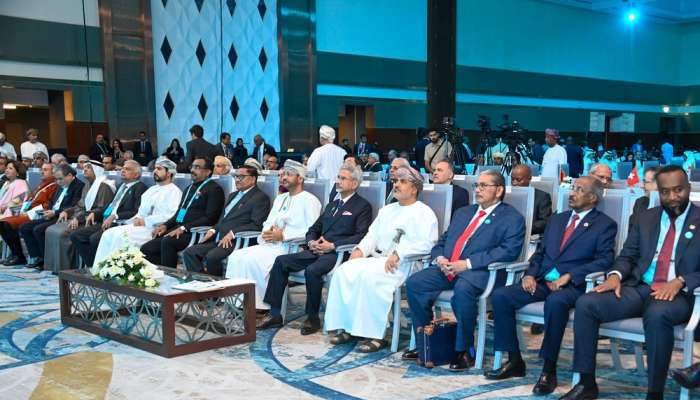
Muscat: Deliberations of the 8th edition of the Indian Ocean Conference began at Oman Convention and Exhibition Centre today under the patronage of Sayyid Badr bin Hamad Al Busaidi, Foreign Minister.
The two-day event is hosted by the Sultanate of Oman, represented by the Foreign Ministry, under the theme “Voyage to New Horizons of Maritime Partnership”. Several Foreign Ministers of the Indian Ocean countries and representatives from 60 countries and international organizations are taking part in the event.
Organized by the Foreign Ministry in collaboration with the India Foundation and supported by the S. Rajaratnam School of International Studies in Singapore, the conference aims to explore the opportunities and address the challenges facing the Indian Ocean countries and enhance regional cooperation in the maritime, economic and security fields.
In his speech at the opening of the conference, Sayyid Badr stressed that the Indian Ocean is not just a body of water, but rather an artery of economic life, a platform for exchange, and a bridge for communication and friendship. He said: “We have a shared responsibility to address issues such as protecting the marine environment, ensuring freedom of navigation, and enhancing the ability of coastal communities to mitigate climate change. This conference also represents an opportunity to explore the untapped potential of our ocean.”
He explained that the economic vision of the Sultanate of Oman is based on achieving a balance between economic growth and environmental conservation, especially in the sectors of the blue economy, port infrastructure, and logistics services, expressing his hope that the conference will develop sustainable and beneficial strategies for all.
He added that the policy of the Sultanate of Oman is based on pursuing points of convergence, promoting dialogue, respecting pluralism, and avoiding interference in the internal affairs of countries, calling on everyone to adopt an approach based on trust, leading by example, engaging in constructive dialogue, and mutual respect. “Through these principles, we can achieve a deeper understanding of different points of view, maximize the benefit from the experiences of our partners, and build a more stable and prosperous future,” affirmed Sayyid Badr.
He pointed out that the Sultanate of Oman has been a maritime nation for thousands of years, as the ocean was a gateway for trade and cultural exchange for our ancestors, and it remains so today, noting that “The Indian Ocean is a bridge, not a barrier, and the Sultanate of Oman considers all countries as partners, with whom we share common interests and are committed to strengthening a comprehensive partnership in the Indian Ocean, ensuring a fair share for all countries, north and south, in the security and prosperity of this vital region.”
On his turn, Dr. Ram Madhav, President of the India Foundation said that the Indian Ocean is the third largest ocean in the world, covering an area of approximately 74 million cubic meters. The population of the countries bordering the Indian Ocean is approximately 3 billion and are witnessing a major transformation and development in the world, as 70% of trade passes through this region, he added.
In his speech, he explained that the Indian Ocean is the link among different countries, but there are many challenges such as piracy, maritime terrorism, climate challenges, human and commodity trafficking, overfishing. He further noted that there are challenges related to humanitarian affairs such as rising sea levels and rescue efforts, all of which require enhancing cooperation among the countries in order to confront these major challenges and create partnerships and develop cooperation between the various participating countries and organizations.
Meanwhile, Khamis bin Mohammed Al Shamakhi, Undersecretary of the Ministry of Transport, Communications and Information Technology for Transport stressed the importance of hosting the 8th Indian Ocean Conference by the Sultanate of Oman due to its distinguished geographical location and the relations it enjoys with the countries bordering the Indian Ocean.
He pointed out in a statement that the conference comes at an important time, especially since the Sultanate of Oman is currently seeking to enhance its role in international organizations in the maritime aspect, noting that there are efforts being exerted between several parties, including the Ministry of Transport, Communications and Information Technology, to shift to green transportation, green ports and sea lanes.
Within the same context, Dr. Abdullah bin Ali Al Amri, Chairman of the Environment Authority, said in a statement that the conference is very important, especially since the world is heading towards making great efforts to adapt to climate change, reduce its effects, protect the environment and ensure its sustainability, which is in line with the Sultanate of Oman's presidency of the United Nations Environment Assembly.
He added that the conference provides an opportunity to exchange views on the possibility of finding the best ways to achieve environmental targets in the Indian Ocean, which is one of the most important and largest bio-oceans in the world and contains crustaceans, small fish and whales, in addition to long-lived organisms and coral reefs that play an important role in absorbing carbon dioxide.
The conference discusses the opportunities and challenges facing the Indian Ocean countries, with a focus on cooperation in the fields of maritime trade, renewable energy, maritime security and technological innovation.
The first day includes five sessions: the first titled “Journey Towards New Horizons for Maritime Partnerships”, the second titled “Strengthening the Voice of the Global South”, the third titled “Securing Maritime Economic Interests”, the fourth titled “Strengthening Maritime Supply Chains / Overcoming Disruptions and Increasing Resilience”, and the fifth and final session titled “Exploring New Horizons / The Evolution of the Maritime Landscape in the 21st Century”.
Moreover, foreign ministers of 27 countries will deliver speeches during the conference, presenting their countries' visions on common security challenges and ways to enhance maritime partnerships.